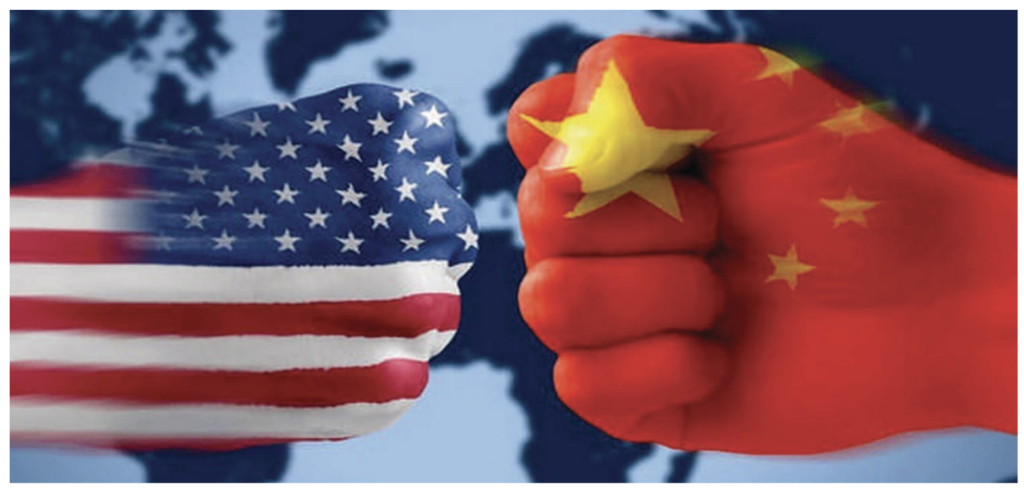January 21/28, 2019: Volume 34, Issue 17
By Ken Ryan
 Beginning the week of Jan. 6, U.S. and Chinese officials began talks aimed at ending the trade war that has imposed hundreds of billions of dollars in tariffs over the past year. The U.S. is seeking concessions in Chinese business practices; in exchange it will eliminate tariffs recently imposed on Chinese goods.
Beginning the week of Jan. 6, U.S. and Chinese officials began talks aimed at ending the trade war that has imposed hundreds of billions of dollars in tariffs over the past year. The U.S. is seeking concessions in Chinese business practices; in exchange it will eliminate tariffs recently imposed on Chinese goods.
If no agreement is reached, U.S. tariffs on $200 billion worth of Chinese goods will increase in March to 25% from the current 10%. That would include steep tariffs on LVT products, including WPC and SPC, as well as some wood products such as bamboo.
The flooring industry is paying close attention to the talks with much at stake for 2019 and beyond. Among executives, there is no shortage of opinions on the issue of tariffs and whether they are good or bad for the U.S. and the economy.
FCNews asked two industry executives—Piet Dossche, CEO of USFloors, and Kip Howlett, president of the Hardwood Plywood Veneer Association—to chime in.
 FOR
FORWhether you support tariffs or oppose them depends on your definition of “fair.” I think it is unfair that the Chinese government systematically targets industries for takeover. I think it is unfair for the Chinese government—with all its resources, power and reach—to attack privately funded firms with tactics such as espionage, bribes and domestic subsidies.
In the most recent review of its antidumping case on engineered wood floors, the U.S. Department of Commerce investigated dumping by Chinese producers, as well as over 40 allegations of Chinese subsidies, and determined it would take tariffs up 48% to 96% to level the playing field for U.S. manufacturers. Those tariffs are expected to be imposed in April for all new imports and are retroactive for imports that arrived in 2017.
The Trump administration has rightly called out China for its predatory trading activities, such as cyberhacking and forced technology transfer. In September 2018, a 10% tariff on all types of Chinese flooring was imposed. That tariff will go to 25% if a sweeping trade agreement is not reached between the U.S. and China by March 1. (For comparison, Chinese fees on imported U.S. engineered wood floors approach 27%.) Most agree that upping the tariff to 25% will start to make a difference and get China’s attention.
These unfair trade practices have allowed China to grow and prosper for the past 40 years. Their citizens’ emergence from abject poverty to relative affluence is just astounding, but their affluence has come at the expense of other countries’ manufacturing bases, especially ours here in America. Manufacturing is often the backbone of local economies. It creates jobs for employees and suppliers who buy houses and pay taxes and supports neighborhood schools, infrastructure and governments. Imports don’t have that same positive effect. That’s why we need to address these predatory actions now before they do more harm.
 AGAINST
AGAINSTI am in full agreement with the President’s strategy for trade agreements between countries to be reviewed and renegotiated on a [periodic] basis and brought in line with the changes in global trade and economic developments. However, I am against the use of tariffs to achieve this objective as tariffs are in many cases just an arbitrary consumer tax on products, regardless of the specific needs, availability and production capacity of the products in the country in which the tariffs are imposed.
Let’s talk about some examples closer to home and look at the tariffs imposed on flooring sourced from China—specifically rigid LVT such as WPC and SPC. WPC was developed in China and introduced in the U.S. market in 2013. A few years later, SPC complemented this rigid LVT offering as a solution for more commercial applications. Since 2013, our industry has seen unprecedented growth in both those rigid LVT products, generating billions of dollars in revenue and profits for all channels involved—a much-needed boost after the meager years during the Great Recession.
Despite significant investments in plant and equipment to manufacture these products domestically, for the vast majority these products are still only made in China today and consequently have to be sourced and imported. Therefore, it makes no sense to impose tariffs on products we currently cannot successfully manufacture domestically in quantities even close to market demand.
The only result from imposing tariffs on these products is the added cost to the consumer. I believe it will result in higher retail pricing and risk slowing demand and severely damaging a growing and profitable segment of an industry once again excited and grateful to have found a successful, money-making product.
